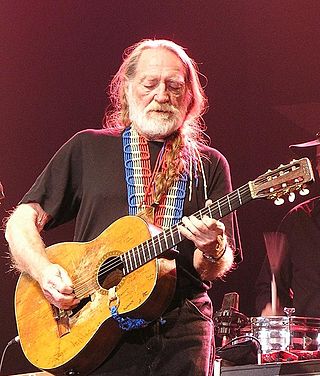
Willie Hugh Nelson is an American country singer, guitarist and songwriter. He was one of the main figures of the outlaw country subgenre that developed in the late 1960s as a reaction to the conservative restrictions of the Nashville sound. The critical success of his album Shotgun Willie (1973), combined with the critical and commercial success of Red Headed Stranger (1975) and Stardust (1978), made Nelson one of the most recognized artists in country music. Nelson has acted in over 30 films, co-authored several books, and has been involved in activism for the use of biofuels and the legalization of marijuana.

Red Headed Stranger is the eighteenth studio album by American outlaw country singer Willie Nelson, released in 1975. Following the success of his recordings with Atlantic Records, coupled with the negotiating skills of his manager, Neil Reshen, Nelson signed a contract with Columbia Records, the label that gave him total creative control over his works. The concept for the album was inspired by the "Tale of the Red Headed Stranger", a song that Nelson used to play as a disc jockey on his program in Fort Worth, Texas. After signing with Columbia, he decided to record the song, and arranged the details during his return to Austin, Texas, from a trip to Colorado. It was recorded at low cost at Autumn Sound Studios in Garland, Texas. The songs featured sparse arrangements, largely limited to Nelson's guitar, piano, and drums. Nelson presented the finished material to Columbia executives, who were dubious about releasing an album that they at first thought was a demo. However, Nelson had creative control, so no further production was added.
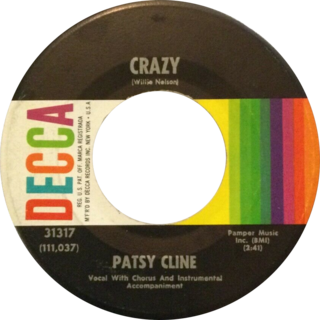
"Crazy" is a song written by Willie Nelson and popularized by country singer Patsy Cline in 1961. Nelson wrote the song while living in Houston, working for Pappy Daily's label D Records. He was also a radio DJ and performed in clubs. Nelson then moved to Nashville, Tennessee, working as a writer for Pamper Music. Through Hank Cochran, the song reached Patsy Cline. After her original recording and release, Cline's version reached number two on Billboard's Hot Country Singles, also crossing to the pop chart as a top 10 single.

Highwayman is the first studio album released by country supergroup The Highwaymen, comprising Kris Kristofferson, Johnny Cash, Waylon Jennings and Willie Nelson. Highwayman, released through Columbia Records in 1985, was the group's first and most successful album.

Shotgun Willie is the 16th studio album by American country music singer-songwriter Willie Nelson, released on June 11, 1973. The recording marks a change of style for Nelson, who later stated that the album "cleared his throat". When Nelson refused to sign an early extension of his contract with RCA Records in 1972, the label decided not to release any further recordings. Nelson hired Neil Reshen as his manager, and while Reshen negotiated with RCA, Nelson moved to Austin, Texas, where the ongoing hippie music scene at the Armadillo World Headquarters renewed his musical style. In Nashville, Nelson met producer Jerry Wexler, vice president of Atlantic Records, who was interested in his music. Reshen solved the problems with RCA and signed Nelson with Atlantic as their first country music artist.

Trigger is a modified Martin N-20 nylon-string classical acoustic guitar used by country music singer-songwriter Willie Nelson. Early in his career, Nelson tested several guitars by different companies. After his Baldwin guitar was damaged in 1969, he purchased the Martin guitar, but retained the electrical components from the Baldwin guitar.

The Words Don't Fit the Picture is the 14th studio album by country singer Willie Nelson.

Yesterday's Wine is the 13th studio album and a concept album by country singer Willie Nelson. Nelson had been recording for RCA Victor since the early 1960s, and had released no significant hit records. By 1970, his recordings had reached mid-chart positions. Nelson lost the money he made from his song-writing royalties by financing concert tours that were generally unsuccessful and unprofitable. In addition to problems with his music career, Nelson had a troubled personal life. He had divorced his wife, Shirley Collie, and his Tennessee ranch had been destroyed by a fire.

Both Sides Now is the tenth studio album by country singer Willie Nelson, released in 1970.

My Own Peculiar Way is the ninth studio album by country singer Willie Nelson. It was his last release in the 1960s. Bergen White was the conductor and arranger. This became Willie's first studio album in which he used his new classical acoustic guitar called Martin N-20 that he named "Trigger".

Good Times is the eighth studio album by American country music singer Willie Nelson, released in 1968. Arrangements were by Anita Kerr, Bill Walker and Ray Stevens.
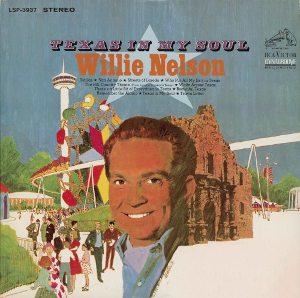
Texas in My Soul is the seventh studio album by country singer Willie Nelson. It was an early concept album that aimed to pay tribute to the State of Texas. The original album artwork features the Alamo, along with three San Antonio construction projects completed in 1968: the Tower of the Americas, HemisFair Arena and the HemisFair monorail system.

The Party's Over and Other Great Willie Nelson Songs is the sixth studio album by country singer Willie Nelson.

Country Favorites – Willie Nelson Style is the fourth studio album by country singer Willie Nelson. He recorded it with Ernest Tubb's band, the Texas Troubadours and Western Swing fiddler-vocalist Wade Ray with studio musicians Jimmy Wilkerson and Hargus "Pig" Robbins. At the time of the recording, Nelson was a regular on a syndicated TV show hosted by Tubb.

Country Willie: His Own Songs is the third studio album by country singer Willie Nelson. This was Nelson's third album, his first for RCA Victor.

...And Then I Wrote is the debut studio album by country singer Willie Nelson, recorded during August and September 1962 and released through Liberty Records.

Country Music Concert is a 1966 live album by country singer Willie Nelson.

"Willingly" is a duet by American country music singer Willie Nelson and Shirley Collie, produced by Joe Allison during Nelson's third session for Liberty Records. Released in March 1962, the album reached number ten on Billboard's Hot Country Singles.
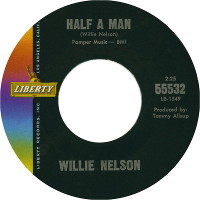
"Half a Man" is a song written and recorded by American country music singer Willie Nelson. The song was released as the A-side of the single for his second Liberty Records album, Here's Willie Nelson. Despite receiving mixed airplay for its content, the song became a sales success, peaking at number twenty-five on Billboard's Hot Country Singles and number twenty on Cashbox's country singles.
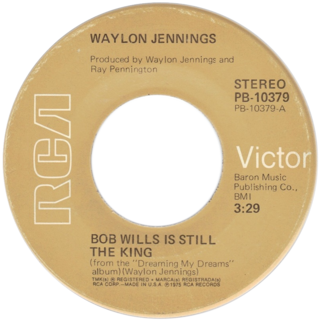
"Bob Wills Is Still the King" is a song written and performed by American country music artist Waylon Jennings, as a tribute of sorts to the Western swing icon Bob Wills.



















